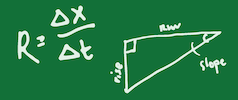Guiding Students through Solving Math Word Problems
An instructor's guide to word problems
Kyle Fredrick (Pennsylvania Western University - California, PA)
What should students get out of this module?
After completing this module, a student should be able to:
- Apply foundational math skills (arithmetic, geometry, algebra, etc.) to higher-order problems.
- Evaluate a word problem and determine the relevant information necessary to solve it.
- Use appropriate equations and reconcile correct variables to solve problems.
- Solve word problems across multiple disciplines using a consistent, systematic approach.
Why are these math skills challenging to incorporate into courses?
Many students are math-averse or have some degree of math anxiety, so avoid taking the time to critically read and consider problems. Others have had a lapse in their math instruction or haven't been adequately prepared for the math required in majors courses. Often, students haven't learned an approach to applied mathematics problem-solving that will allow them to be successful regardless of course level or topic. Finally, some students have developed bad habits in their approach to quantitative applications or underappreciate the expectations for the time and level of work required.
What don't we include in the page?
We do not have a full accounting of the possible scenarios where the "Given/Find/Solve/Evaluate" (GFSE) strategy might be used. The general idea is just that this is a general approach that can be applied to nearly all problems in all disciplines.
There are countless versions of this same principle: slowing students down and forcing them to closely evaluate a problem and apply what they already know or are expected to have learned. However, we encourage instructors, and even faculty across departments, to standardize this or another similar approach to train students in best practices. This is not explicitly shared in the student page, but instructors should consider holding students accountable for GFSE in problem sets, homework, and even exams.
Instructor resources
Support for teaching this quantitative skill
- IRIS Center at Vanderbilt University, High Quality Mathematics Instruction: What evidence-based practices can teachers employ? Page 6 Schema Instruction (https://iris.peabody.vanderbilt.edu/module/math/cresource/q2/p06/)
- Eduard M. Albay, Analyzing the effects of the problem solving approach to the performance and attitude of first year university students, Social Sciences & Humanities Open, Volume 1, Issue 1, 2019. https://doi.org/10.1016/j.ssaho.2019.100006 (https://www.sciencedirect.com/science/article/pii/S2590291119300063)
- SERC collections such as Teaching Quantitative Skills can be a helpful place to look.
Examples of activities that use this quantitative skill
- Hydrology: Calculate runoff volume from a rain event over a defined watershed area. Report the answer in a variety of units.
- Geomorphology: Estimate the critical shear stress necessary for incipient motion of sediment of a particular grain size in a flow.
- Structural Geology: Determine the orientations of joints based on orthogonal component stresses.
